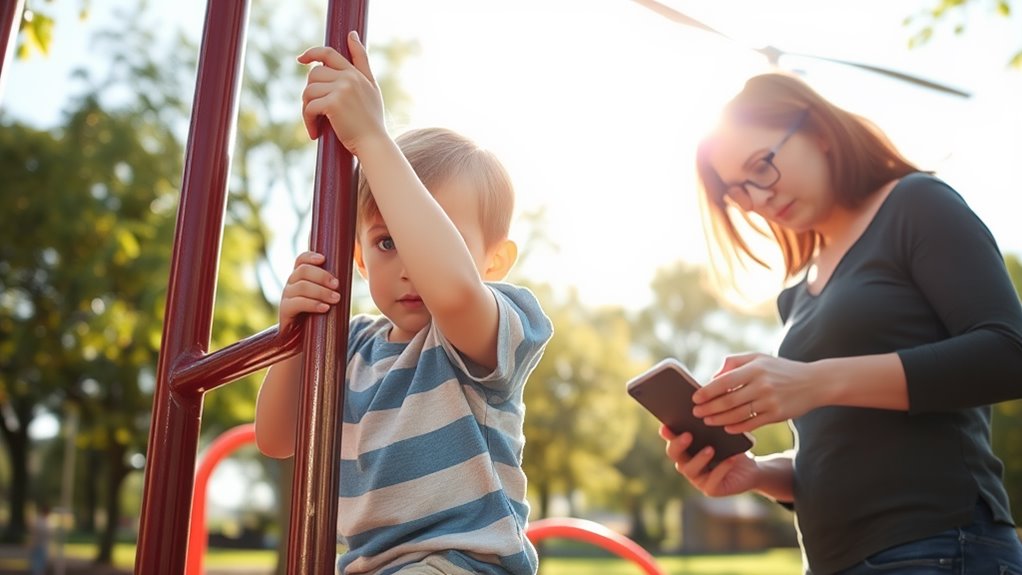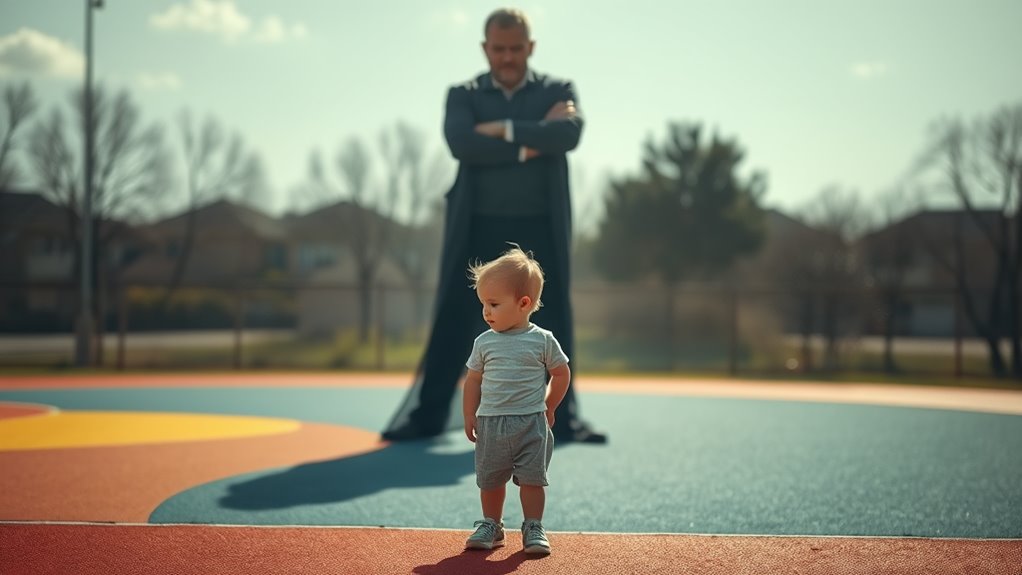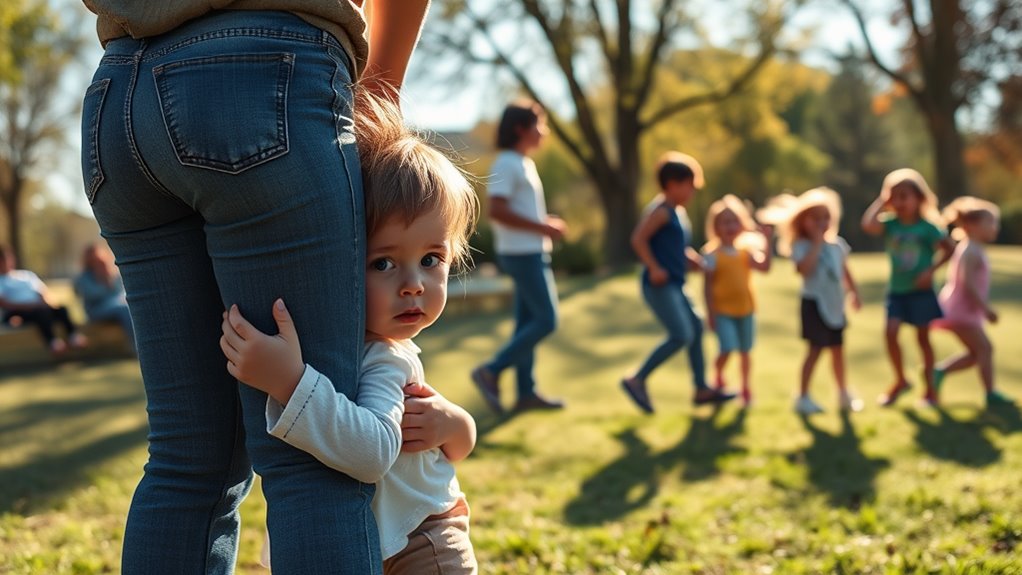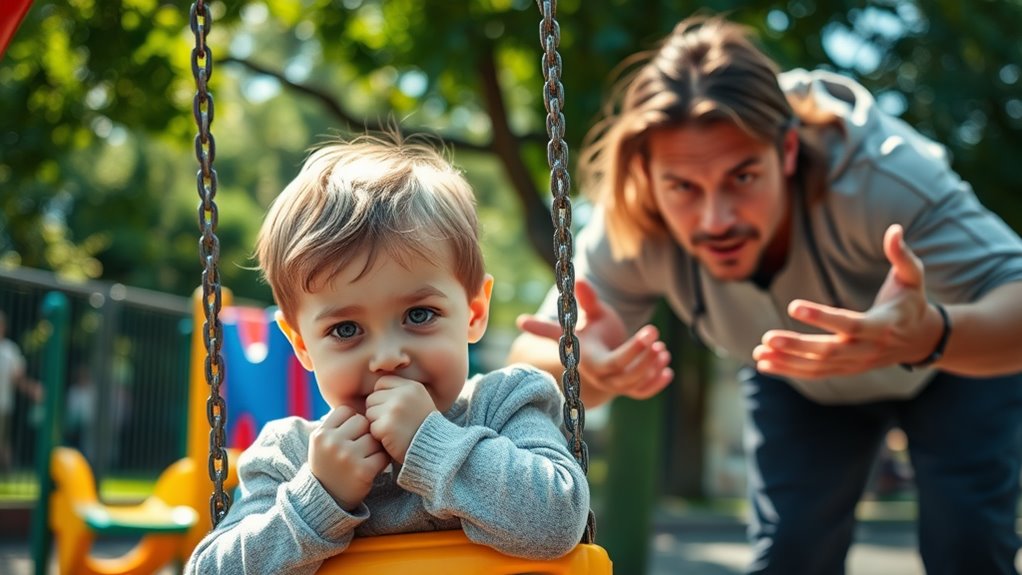How Helicopter Parenting Affects Independence in Kids
Helicopter parenting, where parents are overly involved in their kids’ lives, can seriously affect their independence. When you always make decisions for your child, they miss out on important experiences that help them grow. This overprotection can lead to anxiety and low self-esteem, as kids struggle with decision-making and social skills. Without chances to face challenges, they may find adulthood overwhelming and rely heavily on others for guidance. Encouraging independence through small responsibilities and open communication can help children build confidence. Discovering more ways to balance support and freedom could truly make a difference in their development.
Definition of Helicopter Parenting

When you think of helicopter parenting, picture a parent who hovers over their child, constantly monitoring every move. This term describes a parenting style where moms and dads take an overprotective approach, watching their kids closely and making decisions for them. It’s like they’re always ready to swoop in at a moment’s notice, whether it’s helping with homework or stepping in during a disagreement with friends.
Helicopter parents often believe they’re helping their children succeed, but this can actually limit kids’ chances to learn from their mistakes. Instead of allowing them to figure things out, these parents often step in to solve problems before their children even have a chance to try. This approach can create a dependence on parents, making it tough for kids to develop their own problem-solving skills and confidence.
In essence, helicopter parenting creates a bubble around children, shielding them from challenges and risks. While the intention may be good, it’s important to recognize that kids need the space to grow and explore. They should be allowed to take small risks and face the world on their own terms, fostering independence and resilience.
Psychological Effects on Children

Helicopter parenting can deeply impact a child’s psychological development. When parents hover over their kids, it might seem like they’re protecting them, but this constant oversight can lead to anxiety and low self-esteem. You might notice that children raised in these environments often struggle with decision-making because they haven’t had the chance to practice it. They may worry excessively about making mistakes, fearing that any misstep would lead to disappointment.
Additionally, these children often find it hard to socialize and build friendships. Since their parents are always intervening, they miss out on learning essential interpersonal skills. You might see them feeling isolated or unsure in group situations, which can lead to feelings of loneliness.
Moreover, the pressure of parental expectations can create a fear of failure. Kids may feel they must meet unrealistic standards, which can be overwhelming. Instead of fostering resilience, helicopter parenting can stunt a child’s ability to cope with challenges.
Practical Outcomes of Overprotection

Overprotection can lead to several practical outcomes that hinder a child’s ability to thrive independently. When you constantly intervene in your child’s activities, they may struggle to solve problems on their own. For instance, if you always step in to help with homework, they mightn’t develop the vital thinking skills needed for future challenges.
Additionally, overprotected kids often lack essential life skills. Without the chance to make decisions or face consequences, they may not learn how to manage time, money, or personal responsibilities.
Imagine your child going off to college without knowing how to do laundry or cook a simple meal—these skills are fundamental for adulthood.
Moreover, children might become overly reliant on you for guidance. If they grow accustomed to you making choices for them, they won’t feel confident in their own judgment. This dependency can lead to anxiety when they face situations where you’re not around to help.
Ultimately, while you may think you’re shielding your child from failure, you’re actually preventing them from gaining the independence they need to thrive in life. Encouraging them to tackle challenges will set them on a path to success.
Long-Term Impacts on Independence

The long-term impacts of overprotective parenting can be profound, shaping your child’s ability to function independently as they grow older. When you shield your child from every challenge, they may struggle with decision-making and problem-solving later in life. Without the chance to face obstacles, kids miss valuable learning experiences that help build resilience and confidence.
As they shift into adulthood, they might find themselves feeling anxious about taking risks or making choices, fearing failure because they haven’t practiced managing difficulties. This lack of experience can lead to dependence on others for guidance, which can strain relationships and hinder personal growth.
Moreover, overprotected children often lack essential life skills, like managing finances or cooking for themselves. When they finally have to confront these tasks, it can be overwhelming.
In addition, their social skills may also suffer, as they mightn’t have had the opportunity to engage in healthy peer interactions that foster independence.
Ultimately, your approach to parenting today can set the stage for how your child will handle life’s challenges tomorrow, so consider the lasting effects of your protective instincts.
Strategies for Balanced Parenting

Finding a balance between protection and independence is essential for effective parenting. To achieve this, start by encouraging your kids to take on small responsibilities. Allow them to make choices, whether it’s picking their clothes or deciding what snack to eat. This helps build their confidence and decision-making skills.
Next, set safe boundaries. Let your children explore their interests while keeping an eye on potential risks. You can guide them, but resist the urge to step in every time you see a challenge. Instead, give them the space to learn from their mistakes. Remember, failure can be a great teacher.
Communication is key. Talk openly with your kids about their feelings and fears. This builds trust and helps them feel secure as they navigate their independence. Celebrate their achievements, no matter how small, and remind them that it’s okay to ask for help when needed.
Lastly, model independence yourself. Show them how you tackle challenges and problem-solve. Your actions speak louder than words, and they’ll learn by watching you.
